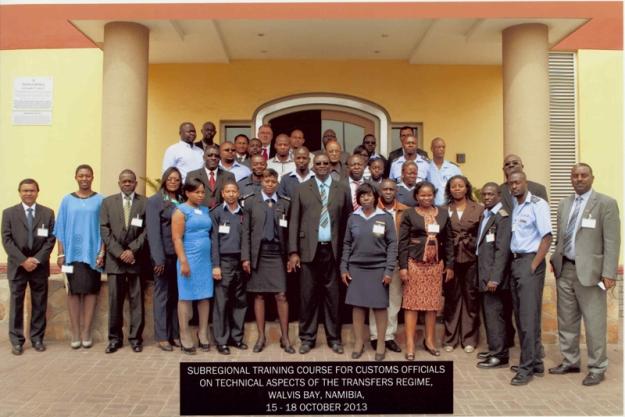
Participants at a training course for customs officers from the east and southern Africa sub-regions.
The OPCW and National Authority of Namibia co-organised a training course for customs officers from the east and southern Africa sub-regions on the technical aspects of the transfers’ regime of the Chemical Weapons Convention (CWC). The course was held from 15 to 18 October 2013 in Walvis Bay for 31 participants from 12 States Parties*, together with representatives from Angola, a State not Party, and an expert from the East African Community (EAC) Secretariat.
The course was designed for trainers from national customs training programmes and held under the auspices of the OPCW’s Programme to Strengthen Cooperation with Africa (“Africa Programme”), with funding from the Kingdom of Norway.
The agenda included an overview of the CWC, the OPCW and the role of National Authorities. It covered the transfers-related provisions of the CWC and the identification of chemicals relevant to the Convention, including recommendations of the World Customs Organization to identify Scheduled chemicals in the Harmonised System. The course stressed the need for effective stakeholder engagement with customs authorities.
Participants were familiarised with relevant information sources such as the Handbook on Chemicals, the Online Scheduled Chemicals Database, the OPCW Central Analytical Database and other useful databases and websites. They discussed discrepancies in the reporting of transfers of Scheduled chemicals and practical customs-related matters such as the control of Scheduled chemicals in ports and free zones, risk assessment, trans-shipments, and relevant software to support the work of customs services.
The course provided information on practical ways to implement the Convention’s provisions and how to eliminate discrepancies in the quantities of Scheduled chemicals declared by importing and exporting States Parties. A field trip was undertaken on the last day of the course to the Walvis Bay seaport, where participants benefited from the first-hand experience of Namibian Customs in handling imported and exported chemicals including those listed in the CWC Schedules.
* Botswana, Burundi, Kenya, Lesotho, Madagascar, Malawi, Mauritius, Mozambique, Namibia, Somalia, Uganda and Zimbabwe
